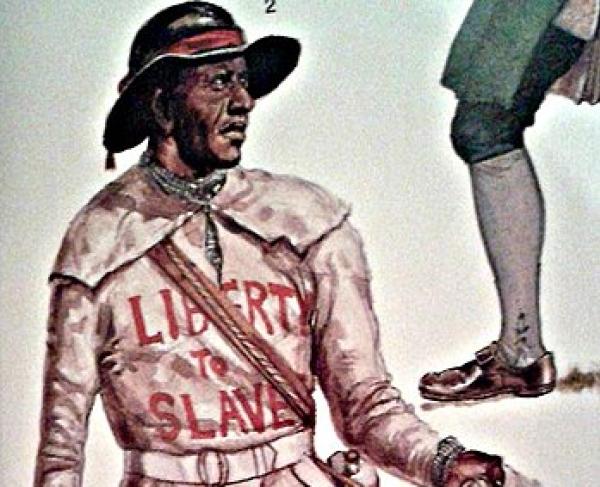
The origins of the Black Loyalist leader known as “Colonel Tye” are uncertain. Recent scholarship seems to point to a man named Titus, who was born into slavery in New Jersey in the early 1750s. Titus was held in bondage by John Corlies, a Quaker who lived near Shrewsbury. In the 1760s, many New Jersey Quakers began to emancipate their enslaved people, freeing them when they turned 21. Corlies, who had a reputation as a harsh master, refused to free his slaves, even when pressed by the other Quakers of the Shrewsbury Meeting. In November 1775, John Corlies placed an advertisement in the Pennsylvania Gazette, offering a 3 pounds reward for the return of “a Negroe man, named Titus.” The advertisement described Titus as “about 21 years of age, not very black, near 6 feet high.”
As Titus escaped slavery in New Jersey, the British governor of Virginia, Lord Dunmore, was simultaneously issuing a proclamation that promised freedom to any enslaved people who escaped rebel owners and fought for the Crown in the American Revolution. Dunmore formed these newly-freed and willing men into a unit called the Ethiopian Regiment. Throughout the war, the British made several attempts to mobilize Black Loyalists to support their war against the rebellious colonists. Some stories about Titus claim that he traveled from New Jersey to Virginia and enlisted in the Ethiopian Regiment; however, no documentation exists to confirm this.
Colonel Tye first appeared as a military leader in 1779. By that point in the war, most of New Jersey was under American control. The British maintained control of 2 bastions, at Sandy Hook and Paulus Hook. New Jersey Patriots harshly cracked down on known and suspected Loyalists, who often fled to British lines for protection. Enslaved people also sought freedom by escaping to British-controlled territory. At Sandy Hook, these groups formed a community known as Refugeetown. This community served as the base for the Black Brigade, a unit of white and Black Loyalists who launched raids against the New Jersey Patriots. Colonel Tye – a title that was merely an honorific rank, not an official one – led the Black Brigade in operations to kidnap prominent Patriots and capture supplies.
In the summer of 1780, the Pennsylvania Gazette reported several raids led by a Black man named Tye (or sometimes Ty), “who wears the title of Colonel, and commands a motley crew at Sandy Hook.” On at least one occasion, Tye and his raiders worked in cooperation with soldiers from the Queen’s Rangers, another Loyalist unit led by John Graves Simcoe. The Black Brigade had a powerful reputation among their enemies: when a portion of the Monmouth County militia was called out to pursue Tye, only two of the seventeen men on the rolls answered the call.
Tye’s final operation was a raid on Colt’s Neck, the home of Captain Joshua “Jack” Huddy. Jack Huddy was a leader of New Jersey state troops who had fought at Germantown and Monmouth. Tye and the Black Brigade attacked Colt’s Neck on September 1, 1780. Huddy fought back, firing on the Loyalists from the windows of his home, until the raiders set the building on fire. Huddy surrendered on the condition that his captors put out the fire. Tye and his men gathered up their prisoners and plunder, and then boarded boats on the Shrewsbury River for the journey back to Sandy Hook. While traveling on the river, Tye’s men were fired on by local militia. In the confusion of the skirmish, Huddy was able to jump into the river and swim to shore. He was wounded in the thigh during his escape, likely from a shot fired by his militia rescuers.
Colonel Tye was wounded in the wrist during the Colt’s Neck raid. The wound soon became infected with tetanus, causing his death a few days later. The Black Brigade would continue to fight under a new “Colonel,” a Black Loyalist named Stephen Blucke, but the unit’s effectiveness was diminished with the loss of its capable leader. At the end of the war, the surviving members of the unit and their families - 49 men, 23 women, and 6 children – would resettle in Canada.
While his exact origins are not known for certain, Colonel Tye was one of the thousands of Black people, both free and enslaved prior to the war, who fought for the British during the Revolutionary War. Their stories are reminders that, for some, the path to liberty meant fighting against American independence.


